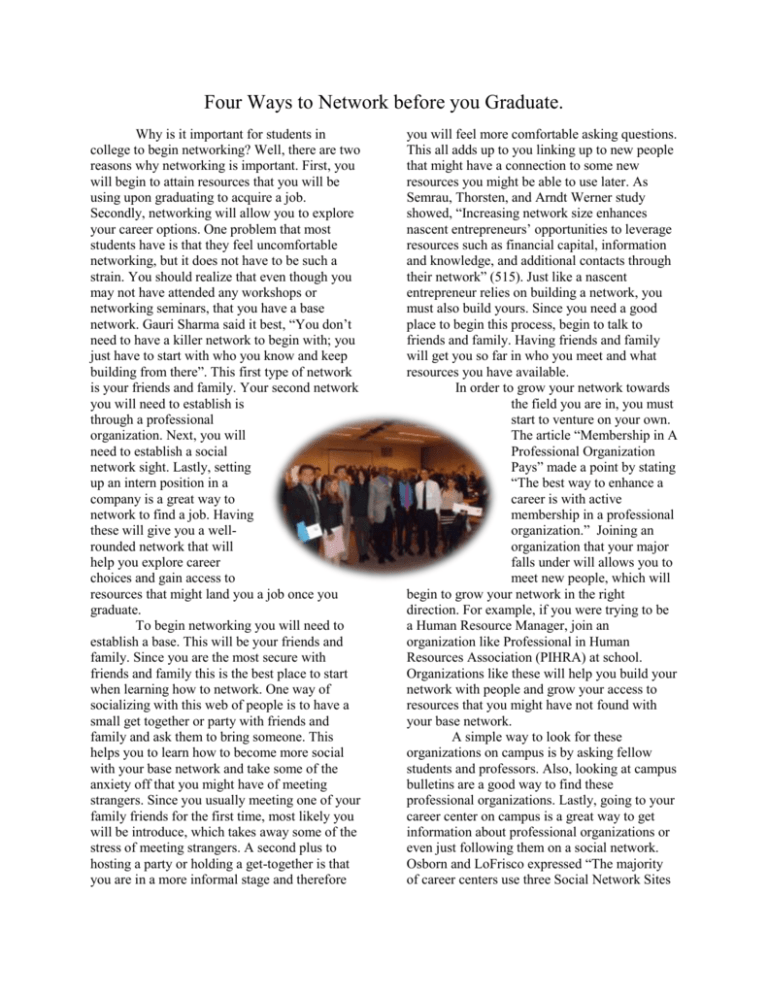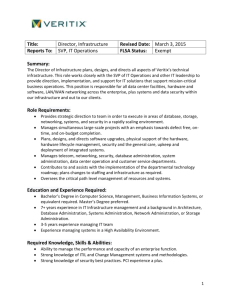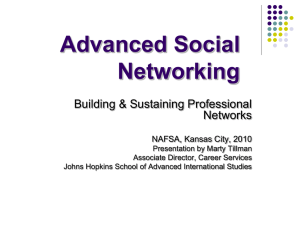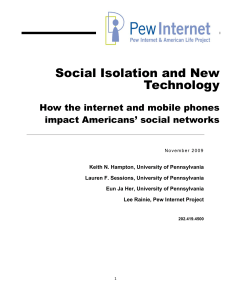Four Ways to Network Before You Graduate
advertisement

Four Ways to Network before you Graduate. Why is it important for students in college to begin networking? Well, there are two reasons why networking is important. First, you will begin to attain resources that you will be using upon graduating to acquire a job. Secondly, networking will allow you to explore your career options. One problem that most students have is that they feel uncomfortable networking, but it does not have to be such a strain. You should realize that even though you may not have attended any workshops or networking seminars, that you have a base network. Gauri Sharma said it best, “You don’t need to have a killer network to begin with; you just have to start with who you know and keep building from there”. This first type of network is your friends and family. Your second network you will need to establish is through a professional organization. Next, you will need to establish a social network sight. Lastly, setting up an intern position in a company is a great way to network to find a job. Having these will give you a wellrounded network that will help you explore career choices and gain access to resources that might land you a job once you graduate. To begin networking you will need to establish a base. This will be your friends and family. Since you are the most secure with friends and family this is the best place to start when learning how to network. One way of socializing with this web of people is to have a small get together or party with friends and family and ask them to bring someone. This helps you to learn how to become more social with your base network and take some of the anxiety off that you might have of meeting strangers. Since you usually meeting one of your family friends for the first time, most likely you will be introduce, which takes away some of the stress of meeting strangers. A second plus to hosting a party or holding a get-together is that you are in a more informal stage and therefore you will feel more comfortable asking questions. This all adds up to you linking up to new people that might have a connection to some new resources you might be able to use later. As Semrau, Thorsten, and Arndt Werner study showed, “Increasing network size enhances nascent entrepreneurs’ opportunities to leverage resources such as financial capital, information and knowledge, and additional contacts through their network” (515). Just like a nascent entrepreneur relies on building a network, you must also build yours. Since you need a good place to begin this process, begin to talk to friends and family. Having friends and family will get you so far in who you meet and what resources you have available. In order to grow your network towards the field you are in, you must start to venture on your own. The article “Membership in A Professional Organization Pays” made a point by stating “The best way to enhance a career is with active membership in a professional organization.” Joining an organization that your major falls under will allows you to meet new people, which will begin to grow your network in the right direction. For example, if you were trying to be a Human Resource Manager, join an organization like Professional in Human Resources Association (PIHRA) at school. Organizations like these will help you build your network with people and grow your access to resources that you might have not found with your base network. A simple way to look for these organizations on campus is by asking fellow students and professors. Also, looking at campus bulletins are a good way to find these professional organizations. Lastly, going to your career center on campus is a great way to get information about professional organizations or even just following them on a social network. Osborn and LoFrisco expressed “The majority of career centers use three Social Network Sites (SNS) to connect with students, promote the center's services and events, and provide career information and links to career-related articles” (269). These are all tools to help you find an organization that will allow you to grow your network towards your field of study. Which brings me to my next topic, social networking. In order for you to develop your network, you have to promote yourself on a social media network and also be able to see the assets that are advertised on these sites. Now people might say that social network sites are not an effective way to network because you don’t establish a good connection. On the other hand you don’t need to make strong ties to pass information or even to be able to see it. For example, it is like going out to a networking seminar. You might not make strong ties but you might learn some new information or gain new resources that you otherwise wouldn’t have had. The article by Pasquale De Meo et al. promoted this idea it read “Weak ties identified through our approach play a crucial role in spreading information over a network, and their removal reduces the portion of the network that can be reached through information diffusion” (80). The key point here is even if it is not an effective way to network with others not having a social network is a handicap. Having these resources at your disposal will allow you to get information that you can use to make new connections or find possible leads to grow your network, which leads me to my final way to network using these new resources you learned. Now establishing yourself in a professional organization and connecting to your base network and social network is important, but to really have a well-rounded network you must go one step further. To do this you must use your base network, professional organizations, and social media network that you will establish to find your last and most important resource. The foundation of these three networks is the key to completing your network circle. You will use these networks to find an internship in order to grow your network further. It is important that you become more involved in order to find your ideal job after graduation because there is no job certainty by having a college degree. The article by Howard, Schnusenberg, and Zaccardi went into depth by saying, “students who have completed an internship or are currently in an internship believe that it will be more difficult to find a job after graduation… while those who have not yet worked as an intern are still blissfully ignorant of the difficulties associated with entering the job market”(45). Without interning you will not build a relation with possible employers. It would leave you with less connections and resources that you can use than those who do. Who knows? You might even land a job with the company you are interning with. A recent study that was given in the article by Elka Jones mentioned “many employers hire directly fromtheir internship programs” (qtd. in Elka Jones 18). Even if you don’t get hired by your intern employer, don’t be disappointed; just know that your network is that much stronger because of the ties you made. Lastly, by setting up a base network (friends and family) you will have a resource that you will have a strong connection with. Even if they are not able to locate a job for you, they might be able to point you to the right direction. Second, joining a professional organization will grow your professional network as well as grow resources available to you. Third, you will need to establish a social media network to advertise yourself as well as see well-round resources that you can use through these networks. Finally, interning will finish your network and let you find solid resources to find a job once you graduate. With these four networking strategies, you will gain some insight in your career. Most important, you might even land a job through these networks. BiographyJorge Esqueda is a graduate from John Glenn High School’s class of 2007. He went to Cerritos College and received an Associates degree in Business Administration. He is currently attending his first quarter at California State University, Los Angeles and is hoping to graduate in the end of 2016. Works Cited DE MEO, PASQUALE, et al. "On Facebook, Most Ties Are Weak." Communications Of The ACM 57.11 (2014): 78-84. Business Source Premier. Web. 17 Nov. 2014. Jones, Elka. "Internships: Previewing a Profession." (2006): n. pag. Bureau of Labor Statistic. Summer 2006. Web. 17 Nov. 2014. "Membership In A Professional Organization Pays." CPA Journal 64.4 (1994): 9. Business Source Premier. Web. 17 Nov. 2014. Sharma, Gauri. "How To Start Networking And Succeed." Forbes. N.p., 28 Feb. 2013. Web. Osborn, Debra S., and Barbara M. LoFrisco. "How Do Career Centers Use Social Networking Sites?." Career Development Quarterly 60.3 (2012): 263-272. Business Source Premier. Web. 18 Nov. 2014. Semrau, Thorsten, and Arndt Werner. "How Exactly Do Network Relationships Pay Off? The Effects Of Network Size And Relationship Quality On Access To Start-Up Resources." Entrepreneurship: Theory & Practice 38.3 (2014): 501-525. Business Source Premier. Web. 19 Nov. 2014. Zaccardi, Mike C., Chelsea M. Howard, and Oliver Schnusenberg. "Student Preparation And Personality Traits In The Job Market." Academy Of Educational Leadership Journal 16.(2012): 35-53. Business Source Premier. Web. 25 Nov. 2014.



